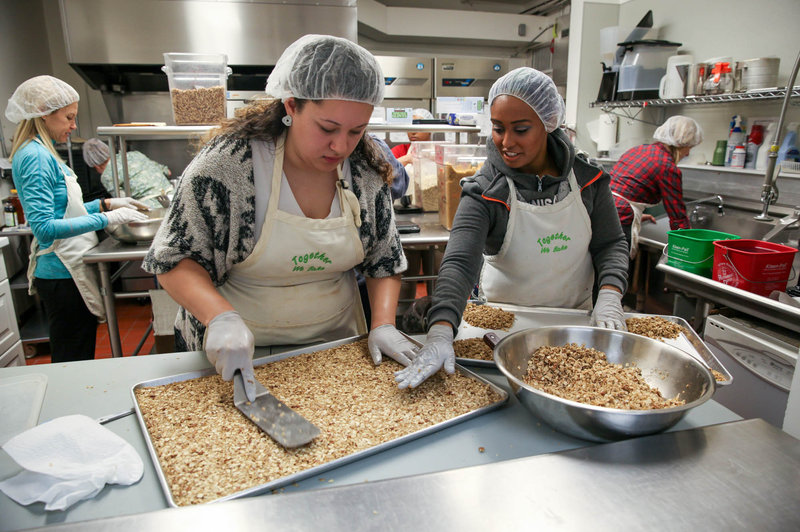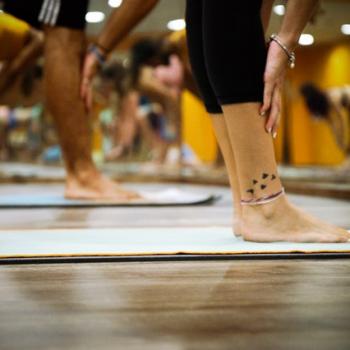
So you’ve just been released from the Slammer. Now you get to join the 20 million Americans who have felony convictions; and the estimated 65 million with criminal backgrounds. The problem is: they’re all looking for work too – and it ain’t easy in a society leery of ex-cons.
Bonnie Rice was released from prison a year ago. With a drug-related history, she knew she no longer had (nor desired) any kind of future with her former druggies.
“I didn’t know where to go, how to go,” Rice told NPR with a quiver in her voice. “It was scary.” She felt eerily alone and vulnerable.
Like many ex-cons, she managed to find temporary accommodation in a halfway house. But in spite of filing numerous job applications in the early months following her release, not many prospective employers called back. “People look down on you,” she says.
Then she found Together We Bake.
It’s a bakery in Alexandria, Va., that makes granola, cookies and kale chips for local food and catering companies. It’s also a job-training and coaching program for women in need of a second chance — many of whom have served time, or are on probation following criminal charges.
“These women face a lot of obstacles,” according to Stephanie Wright, co-founder of the program.
Rice has been in the program for approximately eight weeks. She’s working toward her Serv Safe certificate, a practical transitional step to securing employment in the culinary field once her training at the program ends.
And it’s not only the Yeast that Rises . .
Together We Bake also incorporates resilience training and empowerment classes to better equip trainees to cope with challenges. Wright, who has a background in social work, directs these classes and they’re often led by women who’ve graduated from the program.
The curriculum is based on a book titled Houses of Healing, a mindfulness-based, research-driven philosophy designed to help people change their behavior and overcome feelings of demoralization and lack of self-esteem.
Wright says the emotional training is key. “The women often need help with soft skills,” Wright told NPR. In a sense, they’re pouring new wine into new wine skins; and these newly learned values are what propel them forward.
Buoyed by the support and camaraderie, Rice says for the first time in her life, she’s experiencing her self-esteem rising. “It’s like a team, like a family of sisters,” Rice says. “The women here at Together We Bake have showed me there’s love and respect — and that you are someone.”
Others follow suit . .
There’s a growing movement called Ban the Box, intent on dissuading companies from requiring job applicants to disclose any criminal records, in the initial application process.
Several food enterprises like Butterball Farms in Michigan and Greyston Bakery in New York publicly support the employment of people with a criminal past.
Perhaps the most vocal of such enterprises is Dave’s Killer Bread, (I know . . ) an Oregon-based bakery that  distributes its products nationally, including at many Costco stores.
distributes its products nationally, including at many Costco stores.
Their labels tell the story: Dave Dahl had spent time in prison. “His brother, Glenn, saw a change in him and gave Dave a second chance by welcoming him back to the family bakery.” About 1 in 3 of its employees has a criminal past.
The bakery’s vision of hiring people with criminal backgrounds inspired the creation of Dave’s Killer Bread Foundation, which is hosting a Second Chance Summit in New York next month. The summit’s sole objective is to encourage more employers to follow their lead.
“We see a powerful connection between successful employment of people with criminal backgrounds and reducing the national recidivism rate, the company’s website reads. Some of these workers “can be rock stars” — if given a chance, Genevieve Martin, executive director of the foundation told NPR by phone.
The way of compassion and rehabilitation
In a country beset with violence, criminality, a broken-beyond-repair incarceration system, and wandering ex-cons prone to recidivism, it behooves us, I believe, to take a little leaf out of the books of these visionaries who exemplify for me a better way to heal, welcome, and reform the ‘lost sheep’ in our midst.
What say you?
Cover Photo: Morgan McCloy/NPR
Image Insert: daveskillerbread.com











